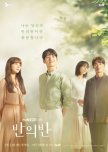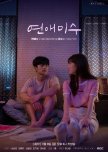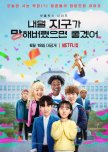
A Piece of Your Mind
19 oamenii au considerat această recenzie utilă
I didn't know it would bother me that much, but it was noticeable. This drama was originally made for sixteen episodes, but tvN decided to cut it down to twelve. A slow drama being cut down means a change of pace, and it was obvious by the end of episode 8 and onwards. The tone and mood of the story is quite dreary, but the delivery was good. While it is mainly a romance drama, it's main theme has always been about loss, and telling the story through its characters has been an up and down experience. I had my doubts before I started watching it because I'm not really a fan of stories that involve AIs (and to be honest, every TvN drama I've watched lately has been quite hard to finish, especially if it deals with a few fantasy), but this doesn't bother me at all. Granted, the mild science element of the story is improbable, completely improbable, but it elevates the major key element of emotional coping, which is the struggle of our male protagonist (and a few other characters later on). Some viewers may find it creepy at some point, especially in the first four episodes, but do know that it needs to be as unsettling as possible to prove a point that an unhealthy obsession should be stopped. You'd also be forced to think what it means to love someone who has always been absent.
Before I get to what I don't like, I have to first recognize Han Seo Woo. Seo Woo is truly one of the best characters k-drama land has to offer. She's sensitive to people's needs. She carefully thinks about what to say before talking. She doesn't look back at her past and get helplessly tied to it. She helps people find happiness they can make for themselves. She's independent. She genuinely cares. She knows her space. Others may notice she feels emotions a bit too much, but there are people like that. Ha Won, on the other hand, it a puzzle piece that needed a lot of healing. Just as he has gotten past one slump, a new discovery threatens his peace, which overall makes his character a bit pitiful. But what I love about it is how he's quick to pick himself up, and with very good character dynamic with Seo Woo, he becomes more than just the victimized character.
To be honest, I loved the first part of this drama, and right when I noticed the change of pace, my view of it has declined quite a bit. While I owe it on pacing, I believe the storyline wouldn't have changed greatly, which is where most of my problems lie. It's quite frustrating because this drama gave me really good characters (in the form of the main leads), but it also gave me one that I can never connect to at all (in the form of Kang In Wook). While I understand that it is about healing, I really hoped they could have gotten a different path for In Wook. I'm not saying he shouldn't heal, but greater repercussions should have been dealt with. I really dislike his character and I can even say this drama would have been a lot better if they introduced a completely different character for a different kind of conflict. I didn't like how they ended things with him, either. Personally, I felt like what he did was not justified at all. And what really irks me is the [lazy] execution of explaining that it could be okay. It felt as if the plot become overwhelmed with the enormity of its characters' actions that it had a hard time connecting, which is why they resorted to a slight change of narrative, which personally felt like a betrayal.
Overall, A Piece of Your Mind worked best when it was at its natural pace. It gave some wonderful lines that fully described the characters. tvN cutting it short definitely affected the drama, like how Minjung's storyline seemed like it wasn't completely attached. The support characters, while they did good, should have also gotten more exposure.
In a way, it seems as if their storylines got haphazardly thrown in.
Considerați utilă această recenzie?

Această recenzie poate conține spoilere
I should say that I made an account here specifically to say something about this drama. And that's saying a lot because while I've seen some dramas before, never had I felt the need to write something about it as strongly as this one did. I needed people to see how good this drama is. For this review, I'd talk about the narrative technique and the characterization, which, for me, sets it apart from other drama. I give it a high rewatch value because if you do see it once, enjoyed it, and then decide to watch again, it'd be interesting to focus more on Parang and how he actually copes to being alone and how his friends may have underestimated him just because he seems childish and/or foolish.Dare I say it, this drama had one of the best pilots ever. The introduction, along with the OST, is exciting and the cinematography (filters that made every scene seem as if it came out from a movie) was something that I highly enjoyed. First episodes usually set the possible genres the drama would go through. It started with a confession, and while all along it went straight through the path of romance, subtly touching the lines of friendship, it somehow changed itself in the final episode, cementing more on the aspects of the latter. Now this is important. The immediate shift of focus is not just by technique but by design, because as much as many may not have noticed it, it actually changed the plot framework the drama has led its watchers to believe. There is an element in the plot in which the entire story heavily revolved around with (Kang Parang's separation anxiety), but what's truly interesting is how this got easily broken down by a perspective that has been kept, or more accurately, overlooked, by the viewers for 9 whole episodes. This is only to be let out in a dramatic and suspenseful self-reflection in the final episode. Moreover, this act of, I'd like to call it betrayal, exactly supports the reason as to why the drama is called "Failing in Love", vaguely supporting or discrediting the role of friendship when it comes to romance. This alone automatically sets a high bar for me.
The characters are very interesting. We are introduced first by a childish boy named Kang Parang who doesn't seem to know how to take care of himself properly. Steadily, we are introduced to the people around him. Lee Shiwon, whom had a crush on Parang since ages but doesn't seem to know if her feelings are platonic or romantic, Lee Shion, the mysterious guy who both Parang and Shiwon like to refer to as a psychopath, and Kim Geon and Jung Chae So, who actively support and add color to the daily lives of our MCs. What I like most about this is the complexity of the relationship between the three leads. It's not surprising to feel that something is off between them, especially with a wild pilot episode. Eventually, each of them is given chances to speak out their thoughts, and while Kang Parang's POV may seem wishy-washy, it eventually becomes a POV that holds closest to the truth. The other two seemingly weave a narrative that, while is utterly convincing and surges the plot forward, is actually self-fulfilling. The story is also unafraid to introduce a very toxic personality (Lee Shion), presented to its viewers in a harsh, sudden, character shift. How the story maintains to keep the genre of romance and friendship despite this difficult situation is actually where the suspense lies. As mentioned before, there is an act of self-reflection in the final episode. While this heavily changed the foundation of the story, you may ask, was it also done to justify the toxicity of Shion? Was it done to make Siwon reevaluate better what Parang really means to her? Was it done to debunk the main idea previously imposed on Parang? What I think the drama wants viewers to think about in the end should be more on these aspects rather than on who could have ended up with who.
Failing in Love is a slow drama that touches a few important issues under the basic representation of youth. It may even become frustrating or disappointing at times, especially to viewers who hop more on the romance side. But to those who want to explore more on the complexity of loneliness, comfort, human needs, and the fine line between romance and friendship, this drama is worth giving a try.
Considerați utilă această recenzie?

A sitcom with potential, perfect for binging
I'm gonna be one of the people who thinks that this drama is good. I do agree with some of the criticisms, especially to the ones which say the comedy is quite over the top or the "haha" sound effects being completely ineffective or badly timed. As a comedy drama, it falls short (though personally I did enjoy most of it in that aspect), but as a short drama overall, it holds potential.What stood out for me were the characters. I watched this show without any expectations. I was greeted with colorful characters that you usually find in, well, any other sitcoms. While at first their variations as to what they can bring for the overall group dynamic seemed too cliché for me, I ended up loving them. Some more so than the others, specifically Carson, Hyunmin, and Sewan. The show juggles through different topics for each episode, focusing on specific characters or pairs or groups of characters. And although I enjoyed how their situations were presented, I think the show didn't play enough with the character dynamics. This is important for a sitcom or any type of show with this format. Although it presents a steady plot, a large portion of the show's focus should be given to how its characters, with all of their variation, interact with each other. And I think the drama didn't experiment with this aspect that much. Often times the same characters are always together, not giving enough room for other dynamic to shine through. Considering this is quite short though, running only thirty minutes for a total of twelve episodes, I hope the show improves on this aspect if ever they make a second season.
Reading tweets or comments from other people, I found that some of them were not quite pleased with having romance as a subplot, or more accurately on the romance of the leads. Personally, I think this aspect of the show was integrated quite well. If you'd expect a sitcom about a group college kids to have no romance at all, then you're in for a disappointment. Most of the themes explored in the series revolves around romance. And I'm okay with this, really. It was delivered well and it was mostly cute. What I'm quite disappointed, however, was there is literally no part in the show which showed their struggles in school. I'd expect to have some frustrations over school requirements or fitting in and all that, considering they are still students, but the show surprisingly did not explore anything regarding this. This is one of the only two things that I hoped the show would improve on if they continue doing it.
That said, I have to commend the drama for being open. I've noticed most Kdramas now have started to break out from the conservative culture, so I'm not really surprised that this drama would delve into certain topics that are generally frowned upon by the more conservative ones. This drama, however, still managed to keep the show brave and innocent at the same time. I also love it for breaking some Kdrama tropes, especially in the drama part. The way it handled the dating scandal bit, the insecurity of the individuals in a couple, the cheating/moving on bit, it went through that with minimal, if there are any, drama at all. It went through resolving these phases quickly, much better than how many other Kdramas would painfully drag on. Although this quick turnout is mainly because of the show's overall length, it isn't to say they handled it sloppily. Instead it was presented maturely, which would sometimes even surprise you considering these characters have their quirks. The romance may seem a bit fast paced, but overall it's not bad. The show is easy to watch because it leads the viewers well. As the show progresses, you will easily identify which characters will be romantically involved with whom before it even happens. Which is why it surprised me how there are some who complained about the "unnaturalness" of the romantic development between certain couples.
If you're in it for the comedy, and the type that makes you giggle nonstop or ugly laughing, then you'll probably hate this show, especially if you can't stand it being corny every once in a while. Also if you don't like some cutesy romance, steer clear from this. BUT if you like a lighthearted show without too much drama with an easy format and strong-willed characters, then this one might be for you.
Oh yeah, I said I only have two complaints, but I have to agree with many others about the laughing sound effects. It's better if it's not there at all. That makes it three. But it's okay, the show is still enjoyable.
Considerați utilă această recenzie?

How to Buy a Friend
1 oamenii au considerat această recenzie utilă
A perfectly-paced story about flawed 19-year olds finding out what it means to have people around
I didn't really know this drama would be so short, The pace keeps up during the third episode (ep. 5-6) and after that it resolves the conflict rather quickly. For a drama with this length, it's impressive how they fit their focus and tried to explore various factors of friendship, solidly shown in the second half of episode 4 (ep. 8). It also gave me Park Chan Hong and Oh Donhyuk, two seemingly different individuals who grows together in an unlikely but rather fateful relationship. What makes this drama wonderful is how openly flawed its characters are, considering they are all 19-year old that, despite no one completely being a loner, doesn't seem to perfectly define what friendship truly is. Throughout the story, Park Chan-hong, who gets inconveniently involved in the events following the suicide of a girl, learns to find people (who, unlike him, shares a connection to the dead student) swallowed by guilt. He becomes an impromptu ally and partakes in uncovering the mysteries surrounding the girl's death. Throughout the story, he finds growth and talent in himself, using these discoveries to propel the story forward and ultimately become the key factor in solving their problems.The drama doesn't excuse bad behaviour but at the same time it shows that one can break free from it as long as they know the importance of a sincere apology and personally develop the will to change for the better. Moreover, it tries to explore ways by which isolation and jealousy can negatively impact self-esteem and cause harm not only to oneself, but also to others. Overall, it teaches its viewers to be more sensitive to the people around them. It's not the best drama out there, but considering its length, it clearly and effectively painted a clear picture of not exactly what friendship is, but how loosely-defined friendships can be when we only think of ourselves. If you want fresh takes on friendship stories (and a teensy-bit romance) without focusing on just the "sunshines and rainbows" part, watch this.
PS:Park Chan Hong is now definitely added to my list of all-time favorite characters.
Considerați utilă această recenzie?

Someday or One Day
1 oamenii au considerat această recenzie utilă
Această recenzie poate conține spoilere
Every episode of this drama really kept me going. There wasn't any unnecessary parts. It was exciting. It had plot twists I never expected. Now, usually dramas that involve time travel are in for a great risk. There are usually loopholes that could heavily affect my opinion on the show. This one didn't fall for that. Or at least there aren't any obvious loopholes. (I haven't found anything though...yet) But it doesn't matter. This drama had the perfect recipe to become a remarkable show.Witty storytelling. Distinguishable and memorable main characters. Wonderful chemistry. Plus it knows where its going. It didn't fall apart and get lost in the middle. Instead it became more refreshing by dividing it into different substories so that it can be followed easier. First part is when Huang Yu Xuan discovers she can time travel and her journey in both past and present. The second part is when Li Zi Wei discovers he can time travel and we are now shifted to all the scenes in part one that was left unexplained, with more exposure on the side of Li Zi Wei/Wan Quan Sheng. Third part is when we find out the doctor can time travel and the whole Chen Yun Ru's death plot. There are plenty of parts that could use deus ex machina but it didn't. I really applaud this drama for that. Incredible. Wonderful. There's really nothing more to say except that this drama is very well done.
Considerați utilă această recenzie?

When the Weather Is Fine
2 oamenii au considerat această recenzie utilă
You don't easily find characters as well-written as what this drama offers
JTBC did it again. When the Weather Is Fine is one of those dramas that doesn't get to be appreciated as much as they should be. Some viewers may find it a little too slow-paced, but that shouldn't be a problem. I cannot really say that this is the best drama out there, but I can confidently say you'll never find main lead characters (and even all the support roles) as wonderfully crafted as Mok Hae Won and Lim Eun Seop. It also includes personalities of all age groups, all being given just the right amount of attention they deserve. This, I really have to applaud. Characters are painfully honest, not exactly to each other as most of the plot's problem's are centered in keeping pain to themselves, but they have a strong sense of who they are. This also doesn't necessarily mean they don't allow space for growth, in fact, it's the opposite. The creators of this drama really went out there and decided to focus mostly on character growth without even trying to make them likable. That alone is honestly enough for me. A drama that respects its characters is a good drama.What makes When the Weather Is Fine special to me is that it steers off from the usual tropes general k-dramas like to explore. Mok Hae Won, as a main lead, does not fall victim to the typical constraint of how mains should be kind and forgiving, or that the entire story revolves around them, or how their actions greatly affect the course of a story. In fact, Mok Hae Won is more often treated like a support, constantly being the last to discover painful truths whilst being self-centered in her own way. Lim Eun Seop is characterized, as a student, that isn't generally good at talking with people, finding more comfort in books instead of participating in mundane conversations. He was given the "loner" stereotype, but as an adult, he becomes an organizer of a book club and is always present at high school mini-reunions. What's even more amazing is that they didn't change the shy-type personality of Eun Seop at all, showing neglect to the more known and exploited negative effects of the stereotype. The drama doesn't get uncomfortably cheesy but it doesn't overlook romance either. It's not even restricted to the leads, either. About three or four love lines are splashed here and there, all of which are generally enjoyable in their own way.
On the darker side of the spectrum, this drama deals with domestic abuse, loss, isolation, suicide attempts, and crime. These topics are thrown into the bag without warning and is left there to unfold in its own way. The ambiance the drama generally sets is cold but is open to any warmth that might come in, just as how winter welcomes the arrival of spring. It is remarkable how the change in seasons is told in parallel to the change and transformation of its characters. Despite dealing with heavy topics, each episode does not fail to incorporate the feeling of lightness, all shown in the simplicity of living away from the busy streets of the city and finding happiness in the simpler things in life. We get to see how getting a little closer to nature brings us a little bit closer to ourselves, away from many distractions but allowing us more opportunities to deal with our inner turmoils.
When the Weather Is Fine is a wonderful story that deals with how one plucks up the courage to open up the things that have always been closed. Staying true to the unpredictability of life, it depicts the past as something you can't run away from, but something you can definitely overcome. It shows the murkiness of honesty and family, may they be blood-related or not. Overall, it's a vibrant presentation of healing, of how we, as humans, can only find the strength to move forward in our own pace, and always more so when the weather is fine.
Considerați utilă această recenzie?



